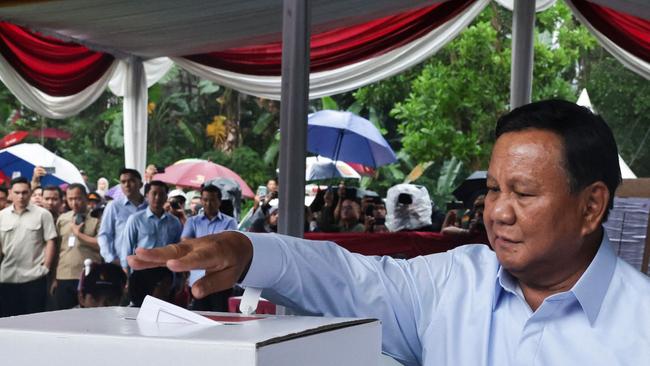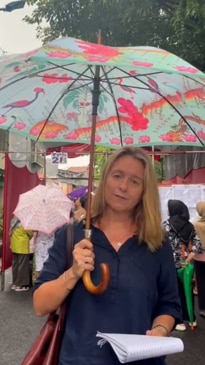
From fiery nationalist to quasi political Islamist and finally now pluralist statesman, the 72-year-old has given cause for optimism and apprehension over a long and controversial military and political career.
In Prabowo’s early days as Joko Widodo’s second-term defence minister, a senior aide told The Australian that he remained wary that Canberra could interfere in the West Papuan liberation struggle just as it had backed East Timorese independence.
Since then, Prabowo has defended Australia’s sovereign right to secure its own national interests through the AUKUS security pact, helped build closer defence ties and publicly acknowledged a debt of gratitude to Australia for supporting Indonesia’s independence struggle against the Dutch.
The hardline nationalist may also take a stronger line on China, which would be welcomed in Canberra – though his frequent outbursts on the campaign trail against foreign intervention are just as pointedly directed at the West as they are at the east.
With reliable quick counts hours after polls closed showing Prabowo romping to a decisive first-round victory, one thing is certain; after a decade of steady, even-tempered leadership under Joko Widodo, Australian diplomats will soon be navigating trickier and more unpredictable diplomatic waters.
Jokowi’s friendships with successive Australian prime ministers have paid dividends, with a free-trade deal finally done, a landmark defence co-operation treaty in the works, and the relationship now elevated to a comprehensive strategic partnership.

Indonesia’s economy is among the region’s most robust thanks to the steady hand of his technocrat Finance Minister Sri Mulyani and Jokowi’s own development agenda, though a controversial ban on the export of raw nickel has hit Australian miners hard.
Jokowi’s surprising calculation is that Prabowo – his erstwhile political rival and a former special forces commander accused of kidnapping and torturing democracy activists towards the end of the autocratic Suharto regime – is the successor most likely to continue the policies he believes will deliver the developed nation status Indonesia craves.
That calculation made Prabowo odds-on favourite to win Wednesday’s election, even if his suitability as a steward of Indonesian democracy appears to have factored little in the equation.
Jokowi remains a hugely popular leader despite proving a lacklustre guardian of our largest neighbour’s democratic project, willing to trade the integrity of independent institutions to push through his policy agenda.
But where the populist President owes his career to direct elections, Prabowo has historically held little regard for the country’s sprawling and expensive direct election process and has talked of winding it back. Many Indonesian political party leaders and Indonesian elites share his view.
Could a Prabowo presidency derail Indonesia’s hard-won democracy?
The answer may lie in whether the old strongman Prabowo has really been put to bed in favour of a more measured statesmanlike leader, as he would like Indonesians to believe.
And how well Indonesia’s democratic institutions and civil society – weakened by a decade of transactional Jokowi politics – might stand up to further attack from within.




Will Australia find a friend in Prabowo Subianto, the temperamental former strongman general who is Indonesia’s most-likely next president?